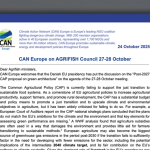The final National Energy and Climate Plans (NECPs) show that 11 out of 18 EU coal-countries do not have a Paris-compatible plan to phase-out coal by 2030, finds new report entitled Just Transition or Just Talk – 2020, published by Ember and Climate Action Network (CAN) Europe.
Seven countries do not plan to phase-out coal by 2030: Bulgaria, Croatia, Czechia, Germany, Poland, Romania & Slovenia. Total installed coal capacity across all 7 countries is set to fall by just 42% in the next decade. 52GW of coal is expected to be operational after 2030, nearly all (~90%) of which is in Czechia, Germany and Poland.
Four countries plan to phase-out coal by 2030 but with a significant increase in fossil gas: Greece, Hungary, Ireland & Italy.
Seven countries are on track to phase-out coal by 2030, without a significant increase in fossil gas: Denmark, Finland, France, the Netherlands, Portugal, Slovakia & Spain.
As part of its European Green Deal, the European Commission has proposed a Just Transition Fund, worth up to €40billion(2), to support the EU regions most affected by the transition to a low carbon economy. The new report shows that without reform the Just Transition Fund risks rewarding climate laggards at the expense of countries with ambitious and Paris-compatible plans for their coal regions.
Under the existing allocation methodology, nearly two-thirds of the Fund will go to the seven countries which do not plan to phase-out coal by 2030. In the long term, two of these countries (Bulgaria & Poland) are also planning a significant expansion of fossil gas use. More than 10% of the Fund will go to the four countries which plan to phase-out coal by 2030 but with a significant increase in fossil gas use.
The report comes a couple of days before the European Parliament’s plenary voting on the Just Transition Fund Regulation. Both in the plenary and during the trilogue negotiations expected to start afterwards, the possible inclusion of exemptions for fossil gas investments in the scope of the Fund, and the Fund’s distribution will be two of the main issues on the agenda.
Without national governments setting a clear timeline to go beyond fossil fuels, it is unclear how the Just Transition Fund will effectively support coal regions and communities through the energy transition. To meet the EU’s commitments under the Paris Agreement and limit global temperature rise to 1.5°C, all EU countries need to phase out coal by 2030, and transition directly to clean electricity without increasing the use of other fossil fuels such as fossil gas.
Charles Moore, Ember’s European Programme Lead, said: “The majority of EU coal-countries are not ready for a just transition. They have no plans to give up coal by 2030 – or they plan to swap coal for fossil gas – another dead end if the EU is to meet its Paris Agreement commitments. Now is the time to support coal regions in countries genuinely undergoing a rapid energy transition. But the Just Transition Fund looks set to reward inaction rather than real climate ambition.”
Elif Gündüzyeli, the Senior Coal Policy Coordinator at CAN Europe, said: “As one of the first pieces of legislation of the European Green Deal, the Just Transition Fund must live up to its name by supporting real transition, not talk. If the EU wants to show commitment to the Paris Agreement, no coal power plant should be operational beyond 2030. Transition means change to clean, renewable energy – not fossil gas. Coal regions need future-proof investments in the new economy, not further entrenchment in fossil-fuel dependency.”
The report calls on the European Parliament, Council, and Commission to ensure that support from the Just Transition Fund is conditional on ambitious coal phaseout commitments – by 2030 at the latest; and that all forms of fossil fuels – and in particular – fossil gas – are fully excluded from the scope of the Just Transition Fund.
The report analyses the final National Energy and Climate Plans (NECPs) of 18 EU Member States that are still using coal for electricity generation. It assesses whether the plans for coal are in line with the EU’s climate commitments and whether the Just Transition Fund would therefore be used to support a real transition in these EU coal-countries. This report is the second part of a series and follows CAN Europe and Ember’s 2019 assessment of the draft NECPs: Just Transition or Just Talk? (3).
Download the full report: pdf2020 Just Transition or Just Talk? (5.59 MB)
ENDS
Notes:
(1) What are the NECPs? To meet the EU’s energy and climate targets for 2030, EU Member States need to establish a 10-year integrated national energy and climate plan (NECP) for the period from 2021 to 2030. Read more on the Commission website here.
(2) The European Commission proposed a fund size of 40 billion Euros in May 2020, however, this risks a substantial cut – down to 17.5 billion Euros following the European Council’s proposal on the coronavirus Recovery Instrument.
(3) https://caneurope.org/
Contacts:
At Ember:
Charles Moore, European Programme Lead, Ember, charles@ember-climate.org
Hannah Broadbent, Head of Communications, Ember, hannah@ember-climate.org
At Climate Action Network (CAN) Europe:
Elif Gündüzyeli, Senior Coal Policy Coordinator, CAN Europe, elif@caneurope.org
Stevan Vujasinovć, Communications Coordinator, CAN Europe, stevan@caneurope.org
About us:
Ember is an independent climate think-tank focused on accelerating the global transition from coal to clean energy. We use data to support high impact, politically viable policies that accelerate the coal phase-out, and empower campaign organisations to do the same.
Climate Action Network (CAN) Europe is Europe’s leading NGO coalition fighting dangerous climate change. With over 170 member organisations active in 38 European countries, representing over 1.500 NGOs and more than 47 million citizens, CAN Europe promotes sustainable climate, energy and development policies throughout Europe.



